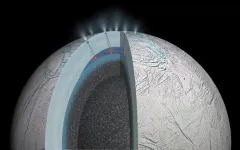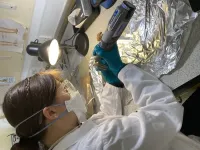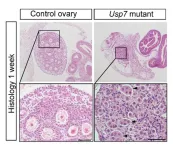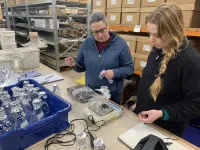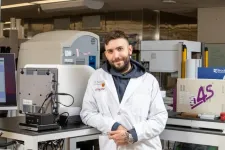(Press-News.org) The University of Houston is proud to announce the appointment of two distinguished professionals to key leadership roles within the Office of Technology, Transfer, and Innovation (OTTI) under the Division of Energy and Innovation. These appointments mark a significant step forward in the University's continued commitment to fostering entrepreneurship, innovation and partnerships between academia and industry.
Haleh Ardebili, the Kamel Salama Endowed Professor of Mechanical Engineering, has been appointed as the new assistant vice president of Entrepreneurship and Startup Ecosystem. Michael Harold, Cullen Engineering Professor of Chemical and Biomolecular Engineering, assumes the role of assistant vice president for Intellectual Property and Industrial Engagements.
“Drs. Ardebili and Harold are both tested leaders in their respective areas – they are already contributing to our rich academic environment with their knowledge, expertise and commitment to innovation,” said Ramanan Krishnamoorti, vice president for energy and innovation at UH. “Having them helm our growing team will help UH continue its culture of innovation and contribution to society.”
In her new role, Ardebili will oversee the entrepreneurship and startup efforts at UH. She will be responsible for directing the startup and entrepreneurship staff within the OTTI, with a focus on advancing faculty and student-related innovation and entrepreneurship initiatives. Among her key duties will be guiding and mentoring to faculty and student startups, facilitating collaborations with entities such as the Wolff Center for Entrepreneurship, and increasing the commercialization of technology developed at UH.
Harold, in his new role, will lead the university's technology transfer activities. He will direct the licensing and IP management staff within the OTTI, and focus on promoting the generation of intellectual property, managing the university's IP portfolio, and fostering industry partnerships. He will also oversee the effective operation and stewardship of UH IP assets, ensuring optimal monetization and protection of intellectual property.
Both positions will play integral roles in increasing faculty engagement, facilitating innovations from research labs to market and enhancing collaboration with internal and external stakeholders. These appointments underscore UH’s commitment to driving innovation, economic development and industry partnerships.
Ardebili, who first joined the University in 2004, previously served as the director of the Cullen College of Engineering’s Innovation and Entrepreneurship Initiative. She and her team developed a cutting-edge fully stretchable fabric-based lithium-ion battery, which holds promise for various applications, including potential use in astronauts' gear, military uniforms and underwater vehicles. Her research has garnered support from the National Science Foundation, NASA, U.S. Department of Defense and more. She also brings industry experience, having served as a research scientist for General Electric R&D between 2000 and 2003.
Harold worked at the DuPont Company in various technical and managerial positions between 1993 and 2000. He joined UH in 2000 as chair of the Department of Chemical Engineering. He served in that role until 2008 and again from 2013-20. He and his students conduct research of catalytic reactions in energy and environmental applications. As principal investigator of the Texas Center for Clean Engines, Emissions and Fuels (TxCEF), he has advanced catalytic technologies that reduce harmful vehicle emissions and conducted testing and verification of technologies for medium- and heavy-duty vehicles. In addition to numerous industry and professional accolades, Harold’s contributions earned him the Esther Farfel Award, the highest honor bestowed to a faculty member at UH, in 2013.
Both Ardebili and Harold will continue their faculty roles in addition to their new responsibilities.
*** To schedule an interview, please contact Rashda Khan: rkhan20@uh.edu or (c)325-656-2824. **
END
The ice-encrusted oceans of some of the moons orbiting Saturn and Jupiter are leading candidates in the search for extraterrestrial life. A new lab-based study led by the University of Washington in Seattle and the Freie Universität Berlin shows that individual ice grains ejected from these planetary bodies may contain enough material for instruments headed there in the fall to detect signs of life, if such life exists.
“For the first time we have shown that even a tiny fraction of cellular material could be identified by a mass spectrometer onboard a spacecraft,” said lead author Fabian Klenner, a UW postdoctoral researcher in Earth and space sciences. ...
Archaeological analysis of a near unique animal cemetery discovered in London nearly 30 years ago has revealed the international scale of horse trading by the elites of late medieval and Tudor England.
Using advanced archaeological science techniques, including studying chemical composition, researchers have been able to identify the likely origins of several physically elite horses and the routes they took to reach British shores during the formative years of their life.
These animals – akin to modern supercars – were sourced from a variety of locations across ...
Francis Crick Institute press release
Under strict embargo: 18:00hrs GMT Friday 22 March 2024
Peer reviewed
Experimental study
Animals
Researchers uncover protein interactions controlling fertility in female mice
Researchers at the Francis Crick Institute have shed light on the proteins controlling the development of ovaries in mice before and after birth. This could lead to a better understanding of how female infertility develops.
Following their research identifying the gene responsible for initiating the development ...
An international team of scientists have warned against relying on nature providing straightforward ‘early warning’ indicators of a climate disaster, as new mathematical modelling shows new fascinating aspects of the complexity of the dynamics of climate.
It suggests that the climate system could be more unpredictable than previously thought.
By modelling the Atlantic meridional overturning circulation, one of the main ocean current systems, the team which included mathematicians from the University of Leicester have found that the stability of ...
As part of a new multi-million-euro academic research programme at University College Dublin (UCD) funded by Met Éireann (the Irish National Meteorological Service) to support the further development of weather and climate services for Ireland using data science and Artificial Intelligence (AI), UCD is seeking to appoint a Full Professor of Data Science for Weather and Climate.
This exciting new senior academic post is a permanent position in the UCD School of Mathematics and Statistics arising from a funding award of €5 million over five years from Met Éireann, ...
Researchers have for the first time discovered evidence of microplastic contamination in archaeological soil samples.
The team discovered tiny microplastic particles in deposits located more than seven metres deep, in samples dating back to the first or early second century and excavated in the late 1980s.
Preserving archaeology in situ has been the preferred approach to managing historical sites for a generation. However, the research team say the findings could prompt a rethink, with the tiny particles potentially compromising the preserved remains.
Microplastics are small plastic particles, ranging from 1μm (one thousandth of a millimetre) ...
Researchers at the University of Toronto and Sinai Health have created a new platform to identify proteins that can be co-opted to control the stability of other proteins — a new but largely unrealized approach to the treatment of disease.
The researchers developed a method to interrogate the entire human proteome for ‘effector’ proteins, which can influence the stability of other proteins via induced proximity. The study marks the first time researchers have searched for effector proteins on this scale, and has identified many new effectors that could be used therapeutically.
“We found more than 600 new effector proteins in 14,000 ...
Attention editors: Under embargo by the journal Nature Machine Intelligence until Friday, March 22, 12 p.m. eastern
Hamilton, ON, Mar. 22, 2024 – Researchers at McMaster University and Stanford University have invented a new generative artificial intelligence model which can design billions of new antibiotic molecules that are inexpensive and easy to build in the laboratory.
The worldwide spread of drug-resistant bacteria has created an urgent need for new antibiotics, but even modern AI methods are limited ...
UNIVERSITY PARK, Pa. — Eating one avocado per day may improve overall diet quality, according to a team led by researchers in Penn State’s Department of Nutritional Sciences. Poor diet quality is a risk factor for many diseases, including heart disease, and many American adults have poor diet quality and do not meet key dietary recommendations provided by the Dietary Guidelines for Americans.
This study was led by Kristina Petersen, associate professor of nutritional sciences, and Penny ...
AURORA, Colo. (March 22, 2024) – The health impacts of a complex protein that plays a major role in the development of Alzheimer’s disease and heart conditions can be lessened by three kinds of drug inhibitors, according to scientists at the University of Colorado Anschutz Medical Campus.
In an overview of the protein and the inhibitors published today in the journal Cell Reports, the CU researchers discussed the best ways to use the interventions.
The protein, CaMKII, is ubiquitous in cells throughout the body but is perhaps best known for its prominent role in the brain and the heart. It is critical in learning and memory but if misregulated can ...



